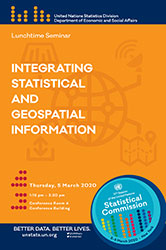United Nations Statistical Commission
Overview 51st Session (2020) Side Events
Lunchtime Seminar
Integrating Statistical and Geospatial Information
- Thursday, 5 MAR 2020
- 1:15 – 2:30 pm
- Conference Room 4
Meeting organized by United Nations Statistics Division
The 2020 Round of Housing and Population Census and the 2030 Agenda for Sustainable Development will guide how we collectively manage and transform the social, economic, and environmental dimensions of humanity and our planet - at least until 2030. In particular, the 2030 Agenda recognises explicitly the need for new data acquisition and integration approaches to improve the availability, quality, timeliness, and disaggregation of data to support the implementation of the new development agenda at all levels, including to exploit the contribution to be made by a wide range of data, including Earth observations and geospatial information, while ensuring national ownership in supporting and tracking progress.
Accordingly, geospatially enabled statistical information is an urgent demand to realise the upcoming round of censuses and to make progress on the 17 Sustainable Development Goals (SDGs), targets, and global indicator framework. Making progress on the SDGs, therefore, requires new data acquisition and integration approaches to improve the availability, quality, timeliness and disaggregation of data at all levels. These data needs, particularly for national implementations of the SDGs are recognised by the Secretary-General in his report on the progress towards the SDGs, noting that the "availability of high-quality, timely, disaggregated and open data and statistics, as well as the capacity to use them, is vital for Governments, international organisations, the private sector, civil society, and the general public to make informed decisions relating to the implementation of the 2030 Agenda1".
National Statistical Offices and National Geospatial Information Agencies are at the nexus of meeting this data challenge and realising its opportunity. At the global level, the Working Group on Geospatial Information (WGGI) of the Inter-Agency and Expert Group on the Sustainable Development Goal Indicators (IAEG-SDGs) is working to ensure from a statistical and geospatial perspective that one of the critical principles of the 2030 Agenda, to leave no one behind, is reflected in the Global indicator framework. Similarly, the Expert Group on the Integration of Statistical and Geospatial Information (EG-ISGI) are working to support the United Nations Statistical Commission (UNSC) and the United Nations Committee of Experts on Global Geospatial Information Management (UN-GGIM) in the development of norms, principles, guides, and standards to increase significantly the availability of high-quality, timely and reliable integrated statistical and geospatial information, including any regional capacity development initiatives.
This side event seeks to bring together actors and experts from both the WGGI and EG-ISGI to demonstrate advancements within the realm of integrating statistical and geospatial information. Segments will provide interactive discussion and presentations on the Global Statistical Geospatial Framework, including details on its adoption by UN-GGIM in making decision 9/106 in August 2019 and its submission for endorsement by UNSC at this 51st session; updates from the WGGI, including their work to apply geospatial information particularly for visualisation, dissemination, and monitoring of the SDGs, data disaggregation and integration of statistical and geospatial information; and, advancements in geospatial information, such as the Integrated Geospatial Information Framework.
This side event is organised by the United Nations Statistics Division and its Global Geospatial Information Management Section under the guidance of the UNSC and UN-GGIM.
1 E/2019/68
-
Primer Presentation (15 mins)
-
The Global Statistical Geospatial Framework
Mr Alex Mudabeti, co-Chair of the EG-ISGI, Namibia
-
The Global Statistical Geospatial Framework
-
Session 1: The Global Statistical Geospatial Framework: Integration for geospatially enabled statistics
Moderator: Mr Alex Mudabeti, co-Chair of the EG-ISGI, Namibia
-
The Global Statistical Geospatial Framework at the national level
Mr Jean-Pierre Cling, INSEE, France The Global Statistical Geospatial Framework at the regional level
Ms Gemma Van Halderen, Statistics Division, Economic and Social Commission for Asia and the Pacific (ESCAP)
The future of the Global Statistical Geospatial Framework
Mr Alex Mudabeti, co-Chair of the EG-ISGI, Namibia
-
The Global Statistical Geospatial Framework at the national level
-
Session 2: Geospatial Information for the SDGs
Moderator: Ms Paloma Merodio, co-Chair of the IAEG-SDGs WGGI, Mexico
-
Managing the integration of data for the SDGs
Ms Paloma Merodio, co-Chair of the IAEG-SDGs WGGI, Mexico Capacity development for strengthening nation integration of statistical and geospatial information
Ms Sainan Zhang, United Nations Population Fund (UNFPA)
-
Managing the integration of data for the SDGs
